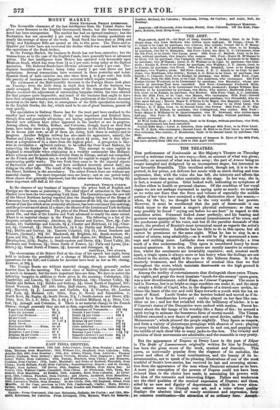THE THEATRES.
THE performance of Semiramide at Her Majesty's Theatre on Thursday proved a welcome treat in two ways,-,-first, on account of what was given; secondly, on account of what was taken away; the part of Areaee being no longer mangled and disfigured by an incompetent singer, but intrusted to our favourite Brambilla. This excellent artist, though not, it is to be re- gretted, in her prime, yet delivers her music with so much feeling and true expression, that, with the voice she has left, she interests and affects the audience more than any other contralto on the stage. In her way, she is, in fact, a woman of genius. Grisi looked well; indicating no symptoms of decline either in health or personal charms. Of the condition of her vocal organ we are not perhaps warranted in saying quite as much: we tremble as we write our fears that the force and volume of especially the middle portion of her voice have sustained a slight diminution since last season,— when, by the by, we thought her in the very zenith of her powers. However, it must be recollected that the part of Semiramide is one which taxes to the utmost a singer's physical endurance; so that we may possibly be found "crying out before we are hurt" in regard to this matchless artist. Fornasari looked Amur perfectly, and his bearing and gestures were appropriate: but the eternal tremulousness of his tones, and the ponderous quality of his voice, snit but ill the peculiar demands of this music, the product of Rossini's most tyrannical mood as regards the artist's capacity of execution. Lablache has too little to do in this opera; but all cannot be prominent on the same night. What he has to sing is, as a matter of course sung admirably,—as it would be if he announced a mes- sage and nothing more. Lablache does everything attentively; a true mark of a fine understanding. This opera is considered heavy by most musical amateurs. It is true, the pieces are mostly massive in construc- tion, whilst the sentiments are invariably repulsive; and, musical merit apart, a tragic opera is always more or less heavy when the feelings are not enlisted in the action, which is the case in this hideous drama. It is the masterly treatment, and the abundance of musical idea that we find throughout the score, which maintain Semizamide on the high ground it occupies in the lyric repertoire.
Among the medley of entertainments that distinguish these extra Thurs- day nights, and gorge the most insatiate "much-for-the-money" opera-goers, was a new divertissement, called Kars, on r Amour Voyageur. The scene is laid in Norway, but is as bright as stage sunshine can make it; and the story is simply a frolic of Cupid, who, in the disguise of a travel-sore urchin, in- clines the heart of the coy and cold Kaye towards a youth with the lea ea name of Maud. Lucile Gram as the heroine looked and moved as if in- spired by a Scandinavian Love-god : smiles played on her face lftce sun- shine on ice ; and her feet twinkled with the brilliancy of icicles: it is as if Canova's statue of the Danzatrice were endued with motion. Perrot ho- vered about the fair image of his worship like a flame of fire: he seemed a spirit trying to animate the beauteous form of mortal mould. The Vienna children executed a new dance of quaint and novel device, called "Pas des Mcnsonneurs"; which pleased the people mightily. They figure as reapers, and form a variety of picturesque groupings with sheaves of corn: playing bo-peep behind them, dodging their partners in and out, and popping into the middle of each sheaf like so many Jacks-in-the-box. The vivacity and precision of their movements are admirable; and the ensemble is very pretty.


























 Previous page
Previous page